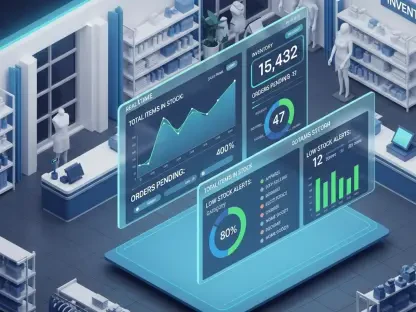Digital transformation and the Internet of Things (IoT) are catalysts for unprecedented change within logistics and supply chains, an evolution expedited by the challenges of a recent global pandemic. These technologies are essential for innovation, providing robust solutions to contemporary problems. The application of blockchain, for instance, introduces enhanced security and traceability into transactions and operations which is crucial for modern logistics. Similarly, IoT connects physical goods to the digital realm, allowing for real-time tracking and data-driven decision-making, optimizing everything from inventory management to shipping routes. Far from mere trends, these technologies represent a significant pivot in industrial operations. Their integration streamlines processes, bolsters efficiency, and provides a competitive edge in an increasingly interconnected world. As industries adapt to this tech-driven landscape, it’s clear that blockchain, IoT, and similar tools are not just reshaping current practices—they’re laying the groundwork for the future of global trade and supply chain management.
Enhancement of Traditional Systems
Integration of IoT in Supply Chain
The incorporation of IoT (Internet of Things) technology has dramatically transformed traditional supply chain operations, bringing an enhanced level of accuracy and management. With real-time tracking systems, supply chains can now track goods with unprecedented levels of detail, reducing the chances of misplacing shipments and allowing for proactive responses to logistical challenges. These high-tech systems utilize sensors that monitor critical conditions like temperature and humidity, providing safeguards for perishable items and maintaining their quality from origin to destination. This integration ensures that stakeholders can oversee the entire supply chain process with more confidence and adjust to disruptions swiftly, securing the integrity of sensitive products every step of the way. Through these advancements, IoT devices are reshaping the supply chain landscape, making it smarter, more efficient, and capable of accommodating the fast-paced demands of modern commerce.
Advancements in Data Analytics
In the realm of modern supply chain management, data has become the cornerstone of optimization efforts. With the advent of predictive analytics, alongside the vast amounts of data collected by big data initiatives and interpreted through the lens of machine learning algorithms, businesses are able to forecast demand and identify potential operational hurdles with greater accuracy. This proactive approach is revolutionizing the way companies approach decision-making. Rather than relying on reactive strategies, businesses can now harness the power of data to convert complex information into actionable insights. These insights enable supply chain managers to not only streamline their processes but also to preemptively tackle issues that could otherwise disrupt business operations. By leveraging data analytics in supply chain optimization, firms can enhance efficiency, mitigate risks, and maintain a competitive edge in a dynamic market environment.
Operational Efficiencies
Streamlining Processes with Digital Technology
Digital transformation has fundamentally redefined the logistics landscape, unleashing an arsenal of high-tech tools that are reshaping warehouse operations and delivery systems. These innovations range from sophisticated warehouse automation that swiftly handles inventory to cutting-edge route optimization software that ensures parcels are delivered with unprecedented efficiency. These advancements do more than just boost efficiency; they are crucial in slashing error rates that can cripple a supply chain’s reliability. The ripple effect of these technological upgrades is profound, often leading to a leaner cost structure that companies are then able to leverage for competitive pricing. This intersection of innovation and efficiency not only fuels productivity but also extends tangible savings to the end consumer.In adopting these modern tools, businesses are setting new benchmarks for speed and accuracy in logistics. The continual refinement of these digital strategies and tools signals a future where logistics processes are not just faster and more reliable but also more cost-effective, meeting the ever-evolving demands of customers and markets.
Enhanced Customer Service
In the realm of logistics, digital innovations have been a game-changer for customer service. Thanks to technological advancements, customers can now enjoy the convenience of online platforms and smartphone apps that offer real-time shipment tracking, the ability to adjust services on the go, and round-the-clock access to customer support. This enhanced level of engagement and clarity in the service delivery process not only gratifies customers but also forges a stronger bond with them. It promotes a sense of trust and reliability, which is pivotal in nurturing customer loyalty. Moreover, satisfied customers are more likely to recommend services to others, effectively becoming advocates for the logistics provider. These digital tools, therefore, are not just facilitating smoother operations, but are also integral in building a robust and loyal customer base. They represent a critical component in the competitive logistics landscape, one that underscores the vital connection between technology and customer satisfaction.
Transition Towards Sustainability and Customer-Centric Models
Embracing Eco-Friendly Practices
Advancements in digital technology are revolutionizing the sustainability of supply chain management. The integration of IoT devices is a game-changer, allowing for real-time optimization of delivery routes to cut down on fuel usage significantly. This not only helps companies reduce their carbon footprint but also leads to operational cost savings. Moreover, leveraging sophisticated data analytics can substantially curb waste by enhancing how businesses manage their inventory.These strides towards eco-friendliness do more than just improve the bottom line; they align with a growing environmental ethic among consumers. Today’s market increasingly prefers companies that demonstrate a commitment to ecological stewardship. By adopting these green supply chain practices, businesses not only exhibit corporate responsibility but also tap into the consumer demand for sustainable products and services. This dual benefit solidifies the case for integrating such technologies into supply chain operations, cementing eco-conscious decision-making as both a strategic and ethical choice for modern companies.
The Rise of the Customer-Centric Approach
In today’s market, consumers expect personalized service, and logistics have adapted to meet this demand. The move to digital has ushered in convenient delivery choices, proactive support, and increased visibility during shipping, all geared toward satisfying the customer. These changes are integral to cultivating enduring customer relationships and encouraging loyalty to brands.Digital transformation and the Internet of Things (IoT) have become critical for the logistics and supply chain sectors, driving significant upgrades in efficiency and customer service. Embracing these technologies is no longer a luxury but a necessity for companies looking to thrive in the dynamic global economy. They provide vital enhancements that establish new benchmarks for industry excellence, environmental responsibility, and consumer engagement. Ignoring this trend could leave businesses struggling to keep pace with market leaders who’ve recognized the value of high-tech adaptations in logistics.









